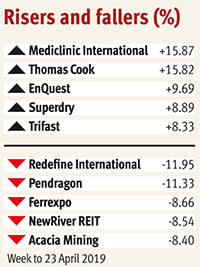Boeing battles on
Embattled aerospace giant Boeing withdrew its guidance for 2019, and suspended its share repurchase programme, as it issued its first quarterly figures since the crash of an Ethiopian Airlines Boeing 737 MAX jet in March. Boeing confirmed that it has completed over 135 test and production flights of an update to the software that has been deemed responsible for the March disaster and the crash of a Lion Air MAX jet last year. “The previously issued 2019 financial guidance does not reflect 737 MAX impacts,” the company said, adding that new guidance would be issued at an undisclosed future date.
Twitter beats
US leads
Shares in Twitter (US:TWTR) climbed by more than 15 per cent on release of its first-quarter numbers. Revenues soared by 18 per cent year over year to $787m (£608m), with “particular strength” in the US. This outperformance, and lower expenses, drove better-than-expected profits, while operating income came in at $94m. Meanwhile, monetisable daily active usage stepped up by 11 per cent to 134m. For the second quarter, the social media group expects revenues to sit between $770m and $830m, with operating income of $35m to $70m. It noted that it is “taking an even more proactive approach to reducing abuse on Twitter and its effects in 2019”.
Taptica plummets further
Ex-chief sells
Shares in video advertising group Taptica (TAP) were marked down following the news of a secondary placing of up to 14.3m shares representing around 10.6 per cent of its issued share capital. The selling shareholders are the Eitan Epstein and Shirley Dahan Trust on behalf of MTD PTE Ltd, Hagai Tal (chief executive of Taptica until his resignation last December), angel investor Ehud Levy and Smart and Simple Ltd. The sole beneficial owners of MTD Pte Ltd and Smart and Simple Ltd are, respectively, Mr Tal and Mr Levy. Taptica recently merged with RhythmOne, and is seeking to change its name to Tremor International.
Chevron faces off
Rival bid emerges
Occidental Petroleum launched a rival bid for US shale producer Anadarko Petroleum, two weeks after Chevron agreed a $50bn takeover deal with the target. Occidental – one of the five largest US oil and gas companies – announced a $76 a share offer for Anadarko, equivalent to a premium of around 22 per cent to Chevron’s cash and shares bid of $63.50. At the time of the latter’s bid, it estimated the acquisition would produce $2bn in cost savings a year and strengthen its US shale production position in the Permian Basin of Texas and New Mexico.
Thomas Cook circled
Offers emerge
Thomas Cook (TCG) was buoyed by reports that it had received multiple approaches over the acquisition of its tour operations business, or potentially the entire company. Potential bidders are said to include Chinese company Fosun, with which Thomas Cook already operates a joint venture in China, as well as private equity firms KKR and EQT. Any potential takeover of the airline portion of Thomas Cook would need to satisfy the European Union’s ownership rules that airlines must be majority owned by European investors. In February, Thomas Cook initiated a strategic review of its airline, with the potential to sell it.
Sanctions clampdown
Waivers ended
The US plans to end exemptions to Iran oil sanctions next month, in the hope of reducing the country’s oil exports to zero. The US authorities said waivers for China, India, Japan, Turkey and South Korea would expire in May, after sanctions were reimposed last year on the “core areas” of Iran’s economy – the energy, ship building, shipping and banking sectors. Six-month waivers were granted to the eight main buyers of Iranian crude – which also included Greece, Taiwan and Italy – to give them time to find alternatives and avoid a shock to global oil markets.
Borrowing falls
Tax rolls in
Government borrowing fell to a 17-year low during the year to April 2019, according to the Office for National Statistics (ONS), at £24.7bn from £41.8bn the prior year. Higher-than-expected tax receipts were behind the reduction, with stable employment and rising wages supporting income tax revenue and VAT receipts. The ONS noted a “notable” increases in government spending on goods and services in March. Government debt as a proportion of national income fell to 83.1 per cent from 84.6 per cent.









